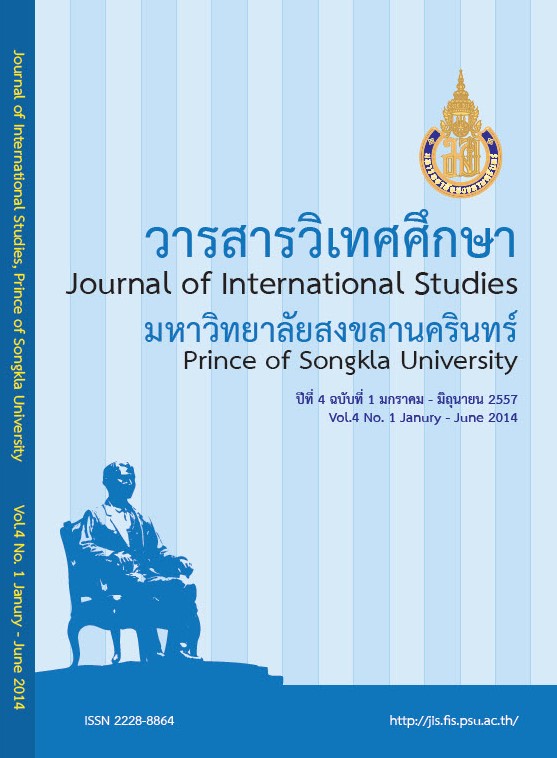Out-of-Class English Language Learning Activities: Beyond the Four-Wall Classroom to the Real-World Usage
Main Article Content
Abstract
With a focus on the improvement of English language skills, some degree of extra exposure to authentic practice beyond the formal classroom setting is considered supportive to the realization of such a goal. Out-of-class English language learning activities lend themselves as a means by which we can exploit the benefits of engaging in motivating activities and improving the English language skills. This article aims to promote the use of out-of-class English language learning to yield language learners more opportunities to practice authentic language usage in natural situations. The emphasis is on identifying the advantages of out-of-class English language learning activities, the development of learning autonomy, and the interrelationship between motivation in learning the English language and the engagement in the out-of-class English language learning activities. Recommendations for how
academic institutions can adopt this strategy in their environment have also been made in order to maximize language learning achievements.
Article Details
Statements and opinions expressed in articles herein are those of the authors and do not necessarily reflect the position of the editors or publisher.
Article, information, text, image, etc. which are published in Journal of International Studies, belong to Journal of International Studies. If anybody or any organization would like to use part or whole of them, they must receive written permission from Journal of International Studies before usage.
References
Bialystok, E. (1981). The role of conscious strategies in second language proficiency. Modern Language Journal 65/2: 24-35.
Brown, H.D. (2001) Teaching by Principles: An Interactive Approach to Language Pedagogy (2nd ed.). New York: Longman.
Chusanachoti, R. (2009). EFL Learning Through Language Activities outside the Classroom: A Case Study of English Education Students in Thailand. Doctoral dissertation. Michigan State University. USA.
Dörnyei, Z. (2007). Creating a motivating classroom environment. In J. Cummins & C. Davison (Eds.), International Handbook of English Language Teaching (Vol. 2) (pp. 719-731). New York, NY: Springer.
Dulay, H., Burt, M. and Krashen, S. (1982). Language two. New York: Oxford University Press.
Ellis, R. 1994. The Study of Second Language Acquisition. Oxford: Oxford University Press.
Gardner, R.C. and Lambert, E. (1972), Attitudes and Motivation in Second Language Learning.In Brown, H.D. (2001). Teaching by Principles: An Interactive Approach to Language Pedagogy. Longman.
Gardner, R.C. (1985), Social Psychology and Second Language Learning: The role of attitudes and motivation. In Brown,
H.D. (2001). Teaching by Principles: An Interactive Approach to Language Pedagogy. Longman.
Gardner, R.C. & MacIntyre, P.D. (1991). An instrumental motivation in language study: Who says it isn't effective?.In Brown, H.D. (2001).Teaching by Principles: An Interactive Approach to Language Pedagogy. Longman.
Gardner, R.C. & MacIntyre, P.D. (1993). A student's contribution to second language acquisition. In Brown, H.D. (2001). Teaching by Principles: An Interactive Approach to Language Pedagogy. Longman.
Gardner, R.C. & Tremblay, P.F. (1994). On motivation, research agendas, and theoretical frameworks. In Brown, H.D. (2001). Teaching by Principles: An Interactive Approach to Language Pedagogy. Longman.
Hyland, F. (2004).Learning autonomously: Contextualizing out-ofclass English language learning. Language Awareness, 13, 180-202.
Kagan, S. (1995) We can talk: Cooperative Language Learning in the Elementary ESL classroom. In Wasanasomsith, P. (2003). A Case Study of Thai ESL Learners’ Language and Literacy Learning in an Authentic Situation: Opening a Bank
Account. Chulalongkorn University Language Institute, Thailand.
Keller, J.M.(1983). Motivational design of instruction. In Brown, H.D. Principles of Language Learning and Teaching. Englewood Cliffs, NJ: Prentice Hall Regents.
Kuh, G.D. (1994). Student Learning Outside the classroom: Transcending Artificial Boundaries. ASHE-ERIC Higher Education Report No.8.
Lamb, M. (2002). ‘Explaining successful language learning in difficult circumstances’, Prospect: An Australian Journal of TESOL, Vol. 17, pp. 35-52.
Lee, C. (2005). Different Types of English to which Korean college students are exposed outside the class. Paper presented at Korean Association of Foreign Language Education.
Ministry of Education, (2001). Basic Education Curriculum B.E. 2551 (A.D. 20018). Bangkok: Ministry of Education.
Mori, S. (2002). The relationship between motivation and the amount of out-of-class reading. (Doctoral dissertation).
Retreived from ProQuest Dissertations and Theses. (Accession Order No. 3040345).
Pearson, N. (2004). The idiosyncrasies of out-of-class language learning: A study of mainland Chinese students studying
English at tertiary level in New Zealand [online]. Retrieved August 2, 22009 from http://independentlearning.org/ILA/ila03/ila03_pearson.pdf?q=ila03/ila03_pears on.pdf.
Pickard, N. (1996). Out-of-class language learning strategies. ELT Journal, 50, 150-159.
Rubin, J. (1975). What the "Good LanguageLearner" can teach us. TESOL Quarterly 9/1:41-51.
Saville, M. &Troike. (2006). Introducing Second Language Acquisition, Cambridge: Cambridge University Press.
Suh, J., Wasanasomsithi, P., Short, S., and Majid, N.A. (1999). Out-of class learning experiences and students’ perceptions of their impact on English conversation skills. Research report. ERIC Clearinghouse on Language and Linguistics. ERIC
document no.ED433715.
Sumonviriya, S. (2007). A Comparison of Out-of-Class English Learning Language Activities, Learning Strategies, and
Attitude towards Autonomous English Language Learning of English Program and Regular program Students in Secondary Schools. Master Thesis, Chulalongkorn University.
Terenzini, P.T.; Springer, L. and Pascarella, E.T. (1993) In- and Out of- Class Influences Affecting the Development of Students' Intellectual Orientations.ASHE Annual Meeting Paper.
Yap, S.L. (1998). Out-of-class use of English by secondary school students in a Hong Kong Anglo-Chinese School. Master Thesis. University of Hong Kong.


